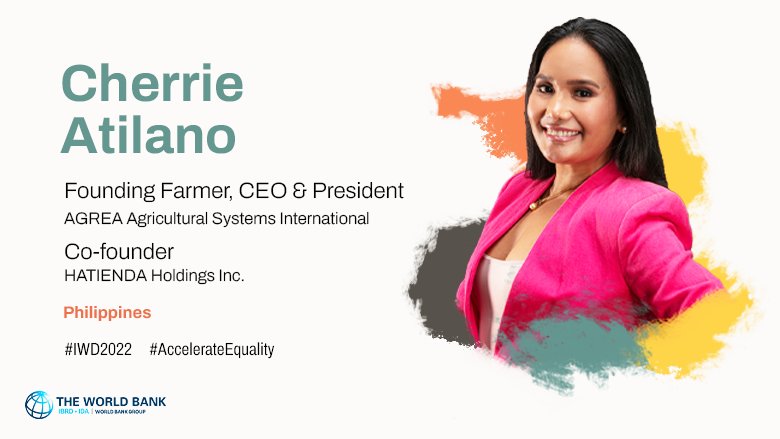I grew up in a sugarcane farm in Philippines’ Negros Occidental province. As a young girl, I have been very observant of my communities, I dreamt of being a farmer and an entrepreneur. Making this dream happen is a life worth living. It has been more than two decades of being inspired to contribute to the sector by being an agricultural scientist and an agri-preneur.
AGREA has been working to establish a One Island Economy in the Philippines, while creating an ecology of dignity to food producers. Hatienda Holdings supports AGREA to develop farm tourism to create more livelihood opportunities in the community.
In the country, we have about 12 million hectares of underproductive lands; most of them in the countryside. Many Filipinos are going to bed hungry, and the pandemic has worsened the situation – with 4.5 million families now experiencing involuntary hunger. People are leaving rural areas to seek better lives in greater cities, so I hope that our work in the future will be replicated in different islands in the country to provide agricultural economic opportunities for the people to reverse migration from the urban to the rural areas, make the land productive to create more Filipino made products, and address food insecurity.
I think when your passion and purpose coincide, it is the most enjoyable work one can ever have. I feel like it is not work at all. Despite challenges, it brings me joy to know that we are making impactful changes to the lives of others, more importantly, to food producers.
Radical optimist and a dreamer.
One of the lessons I learned from my mother, who is a single parent, is that building a strong inner resilience is the most difficult thing to do as a woman. There will be much unfairness, inequality and prejudice anywhere you go, but when your core is strong and your values are right, everything can be accomplished with dignity, pride, and enthusiasm.
Climate change is real and is felt on the ground. The past years, the weather patterns have been so unpredictable for the farmers and fishers. Typhoons come strongly in the third quarter of the year. There is a need for more technologies to support food production that is climate-resilient. This could include smart agri-technology to help predict climate patterns, soil health and better utilization of resources, as well as post-harvest supply chain improvements to ensure farmers are producing zero waste. Sustainable food production can give them decent incomes and contribute to food security.
It is important to consider food and climate moving forward. Unsustainable agriculture practices release a lot of methane to the atmosphere; however, agriculture is also the biggest solution for carbon sequestration when done sustainably. When farmers are trained to not only produce food, but to be stewards of the environment, they will be the force for change and the solution of the most pressing problems we experienced right now in the food systems and climate crisis.
Women compose half of the population in the agriculture sector, but are given less importance and recognition. They are great nurturers and that’s what we need in the agriculture sector that is somehow still a male-dominated industry. When women are given legal rights to their land, better access to financial support, and capacity building programs, we will witness so much change in the household and farming at family levels. On the ground, I see that women are the ones budgeting at home, and when they are farmers, they always make sure their families have the healthiest meal, which is critical in building the human capital of each country. Indeed, an investment in women is an investment to the entire community. I believe that when we empower women in the agriculture sector, we can see change that is not transactional but transformational.
We need to continue empowering women, especially those who are role models and mentors. At the same time, we need to build more male champions who will advocate for more women to have access to educational support and career opportunities.
Visualize what you want to be and actualize it by finding harmony in your personality, passion, and purpose; they can exist together in making you a good leader.
Educate yourself; learn, serve, and be unapologetic in doing the things that make you wake up every day with great hope in your heart. A leader with a dream is a leader with a clear vision.
I hope that no more food producers – both farmers and fishers – are going hungry and malnourished. No more children going to bed hungry. No more forests will be torn down because we need more land to produce food.
I hope that everyone sees the importance of the connection of food to Mother Nature. Food is like our umbilical cord to Mother Earth, when we forget this connection, it will be easier for us to destroy nature.
**The views expressed in this interview do not necessarily represent the views of the World Bank Group.

